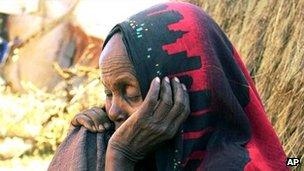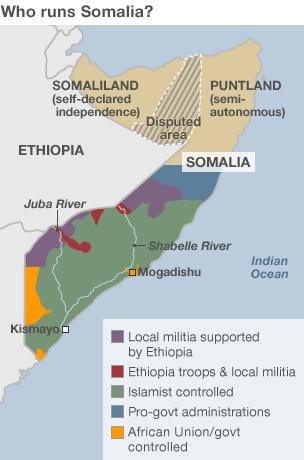Somali refugees top one million mark, says UN agency
- Published

Somalia is one of the world's "worst refugee crises", the UNHCR says
More than a million Somalis have now fled the war-torn nation for neighbouring countries, the UN refugee agency has said.
The UNHCR said insecurity and food shortages continued to be the main reasons for the flight.
Only the conflicts in Afghanistan and Iraq forced so many people to leave their homes in the past decade.
Somalia has been racked by fighting since its last effective national government was toppled 21 years ago.
Al-Qaeda-linked al-Shabab militants still control much of the country, but they have been under pressure from Somali government troops and African Union soldiers.
'Massive pressure'
"Somalia's refugee exodus crossed a new threshold this past week," the UNHCR said in a statement on Tuesday.

It said that some 30,000 Somali refugees were registered in the Horn of Africa - mainly Kenya and Ethiopia - and also in Yemen in the first six months of the year.
This shows "lower but steady" numbers of people still fleeing the country, the agency said.
This was partly because the drought in Somalia was less severe compared with the past year, when nearly 300,000 Somalis left the country.
But the statement stressed that Somalia remained "one of the world's longest and worst refugee crises".
It said the continuing crisis was putting "massive" pressure on the entire Horn of Africa and beyond the region.
In addition, more than 1.3 million Somalis were internally displaced, meaning that about a third of Somalia's estimated 7.5 million population lived "in forced displacement".
The number of refugees fleeing Somali for countries around the world hit the million mark in the second half of 2011, but the latest UNHCR figures refer to refugees in Somalia's neighbouring nations.
Since 1990, other emergencies to have created one million refugees according to the UNHCR are:
Ethiopia - 1.4m (1990)
Mozambique - 1.5m (1992)
Rwanda - 2.3m (1994)
Afghanistan - more than 2m
Iraq - 2.3m (peaking in 2007).